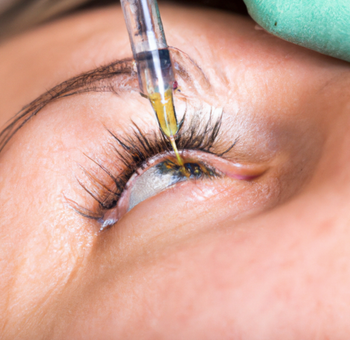
- Ophthalmology Times: September 1, 2021
- Volume 46
- Issue 14
Tumor necrosis factor α antibody drops meet primary efficacy end point
Anterior uveitis therapy offers anti-inflammatory effect after dosing is stopped.
Reviewed by Anat Galor, MD
OCS-02 (Oculis), a novel, topical tumor necrosis factor (TNF)–α antibody eye drop, is efficacious for reducing ocular inflammation in patients with acute anterior uveitis.
The drug had a responder rate of more than 55% and eliminates the steroidal adverse effects, reported Anat Galor, MD, a staff physician in surgical services at the Miami Veteran Affairs Healthcare System and a professor of ophthalmology at Bascom Palmer Eye Institute at the University of Miami Health System, both in Florida.
She presented the results from a phase 2 study of the treatment at the Association for Research in Vision and Ophthalmology 2021 Annual Meeting, which was held virtually.
OCS-02 is a new, potent ophthalmic formulation of a specific TNF-α antagonist that is filling a treatment gap for this patient population.
“OCS-02 is a first-in-its-class antibody fragment that inhibits the inflammatory cytokine TNF-α,” Galor said. “The drug provides specific efficacy with a favorable safety profile compared to the corticosteroids, immunosuppressives, and nonsteroidal anti-inflammatory drugs used to treat acute anterior uveitis.”
The advantage of this molecule is that it was specifically designed for delivery to the eye: It is substantially smaller, at 48 kDa, than the immunoglobulin G molecule, which is 149 kDa.
Historically, anti–TNF-α biologics, when administered systemically or intravitreally, provide treatment benefits in patients and/or animal models of uveitis, active diabetic retinopathy, neovascular age-related macular degeneration, cystoid macular edema after cataract surgery, and branch and central retinal vein occlusion.
Therefore, it was thought that an eye drop might be beneficial in patients with increased TNF-α levels in the aqueous because it penetrates the anterior chamber.
Related:
OCS-02 efficacy
Prior to the trial under discussion, an exploratory study in patients with acute anterior uveitis showed that the drop reduced anterior inflammation.
OCS-02 was also found to be significantly better versus placebo in 134 patients with dry eye in a randomized, double-masked, placebo-controlled study.
Another trial conducted by Novartis showed that a predecessor (ESBA105) to TNF-α demonstrated efficacy that was comparable to OCS-02, Galor said.
A comparison of the potency of TNF-α indicated that it has greater potency than adalimumab, infliximab, and ESBA105 in reducing TNF-α apoptosis in vitro.
Phase 2 trial
The objectives of this multicenter, randomly assigned, double-masked pilot trial, in which OCS-02 was used in humans with acute anterior uveitis for the first time, were to find evidence of efficacy of this topical formulation in reducing ocular inflammation in acute anterior uveitis and to evaluate the safety and tolerability of the drug for up to 21 days in the study patients.
Related:
In this “active controlled” trial, dexamethasone was used in the control arm to allow masking of the investigators and patients; however, no comparison between the 2 drugs was undertaken. Successful use of OCS-02 was defined as a responder rate of more than 30%.
All participants had active noninfectious acute uveitis in at least 1 eye with inflammation that started within the previous 2 weeks, and an anterior cell score of 2+ or 3+; those with scores of 4+, hypopyon, or inflammation outside of the anterior chamber were excluded.
Twenty-five patients were randomized to OCS-02 and 10 patients to dexamethasone, with both arms at 8 drops per day; after 15 days the dose was reduced to 4 drops per day.
At day 22, OCS-02 was stopped and the dexamethasone was tapered. Rescue therapy was available at any study time point.
Related:
The 2 groups of patients were well matched demographically. The primary efficacy end point was the rate of response at day 15 of treatment. The responder rate was defined as a 2 or more reduction in the cell grade.
“The primary end point was met by 55.62%, with 14 of the 25 patients responding on day 15,” Galor explained.
Regarding the grade, 76% of patients achieved cell grade 0 (defined as < 1 cell/field) at some point. The therapeutic effect lasted after OCS-02 was stopped.
“The drug effect continued to increase after the OCS-02 taper on day 15 and discontinuation on day 22,” Galor explained.
The most common adverse events associated with treatment were anterior chamber cells and ocular pain (13.8% each); iridocyclitis, anterior chamber flare, iris adhesions, and photophobia (10.3% each); and ocular irritation and IOP, 6.9% each).
Related:
The effect on IOP was of interest because steroids are associated with IOP increases. In this trial, 1 patient had a significant IOP increase of 11 to 30 mm Hg.
Overall, IOP in most patients stayed the same or decreased slightly. The IOP change in this study slightly favored OCS-02.
The primary study findings were that OCS-02 met the proof of concept that a topical TNF-α inhibitor reduced anterior chamber inflammation.
The results met the prespecified criteria for the primary analysis, ie, the responder rate exceeded 30% with an observed percentage of responders of 56.62% and a lower bound of 40%.
The drug requires a few days to exhibit its efficacy, but the effect continued to reduce the anterior chamber inflammation for a few days after dosing stopped. No significant ocular or nonocular safety findings were observed.
“OCS-02 has the potential to be a useful tool in addition to the current armamentarium for treating anterior uveitis,” Galor concluded. “However, it likely will not be the first-line treatment for the disease. Oculis is considering a phase 2 study for chronic anterior uveitis.”
--
Anat Galor, MD
E: [email protected]
This article is adapted from Galor’s presentation at the Association for Research in Vision and Ophthalmology 2021 annual meeting. She is a consultant to Oculis.
Articles in this issue
over 4 years ago
Specialists offer pearls for physicians’ financial healthover 4 years ago
Evolution of optical coherence tomography of the human eyeover 4 years ago
Expert insights: Flares of dry eye diseaseover 4 years ago
Home monitoring patients for AMD: Targeting CNVover 4 years ago
Study targets utility of epithelial thickness mappingover 4 years ago
Outdated magazinesover 4 years ago
Patient glaucoma management focuses on pivotal studiesover 4 years ago
Throwing everything away ... except the patient and the surgeonNewsletter
Don’t miss out—get Ophthalmology Times updates on the latest clinical advancements and expert interviews, straight to your inbox.





























